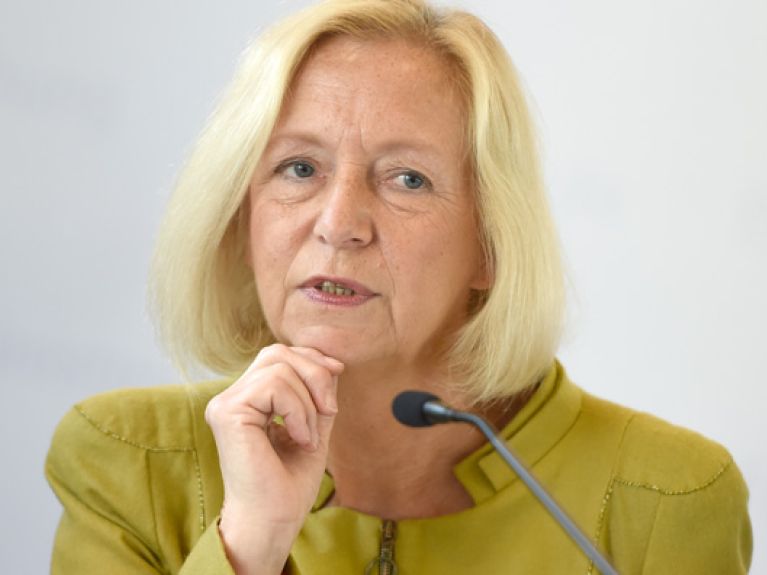“Europe is a continent of ideas”
Federal Minister Johanna Wanka on the European Research Area and the Horizon 2020 and Erasmus+ programmes.

Germany is the first EU member state to present its own strategy for the future development of the European Research Area, or ERA for short. What are the most important goals of this strategy?
Europe is very important for Germany’s continued success as a land of research, because we will only be able to maintain our position against other powerful research regions in the world by engaging in European cooperation within a strong and attractive common research space. That is why the ERA strategy that was agreed by the German Cabinet in mid-July aims to actively promote a deepening of the European Research Area. As a result, in future we will be focusing even more strongly on important European and international subjects – for example, an aging population, neurodegenerative diseases such as Alzheimer’s, climate change and questions of healthy nutrition – in supranational research programmes known as joint programming initiatives. The strategy also includes the pan-European development of large research infrastructures, such as the European Spallation Source (ESS) in Lund, Sweden. Germany and 15 other European countries have agreed to set up the world’s most modern research institution with a new kind of neutron source as part of the ESS. The free, crossborder exchange of knowledge is also a core element of the European Research Area. That’s why we want to develop unrestricted routes to knowledge – in other words, open access to research findings, data and publications that have been produced in publicly funded research projects.
What makes the European Research Area attractive in the global competition for knowledge?
Europe produces nearly 30% of the world’s knowledge – with a roughly 7% share of the world population. The numbers show that Europe is a continent of ideas. The European Research Area builds on the diversity of research systems in EU member states and opens up opportunities of engaging in research across national frontiers in excellent teams at universities and world-class research facilities, such as our Max Planck institutes, and using the best research infrastructures. Only Europe offers this variety of excellent research opportunities.
Germany’s ERA strategy also addresses shortcomings – for example, when it comes to the development of an open labour market for researchers. How can this challenge be met?
The open labour market for researchers is an important area of action within our strategy. Here we are focusing on the conditions for the free movement of researchers. It is also important to make career paths in science and research more predictable and more transparent. For example, researchers need reliable information about what happens to their pension rights if they move from one country to another for career reasons. We also want to improve the prospects for junior researchers and expand structured PhD programmes. Interesting working and research conditions and an open culture of welcome make Germany and Europe attractive for the best talents from all over the world.
What role will the German science and research landscape play in the European Research Area?
A very crucial one! So far we have successfully worked together in building the European Research Area and have made considerable progress towards its further deepening. The commitment of our scientific and research institutions will be of crucial significance in realising the goals of our European Research Area strategy. The measures we have planned must now be filled with life and put into practice. We can only accomplish this in a close and trust-based partnership of politics, business, research and science.
Horizon 2020, the new EU Framework Programme for Research and Innovation, brings together all the European Commission’s funding programmes relating to research and innovation. Where do the opportunities of such a consolidation lie?
Ideas must create jobs. That’s only possible if research and innovation cover the entire innovation chain from basic research to applied and market-related research. This combination of research and industry does not only offer researchers in higher education and research organisations especially attractive opportunities, but also involves small and medium-sized enterprises. In Germany we have been successfully pursuing this course for a long time in our High-Tech Strategy, and not least for that reason at the beginning of September the Cabinet agreed a “new edition” of the strategy. We are pleased that we have now been able to successfully contribute our experiences at the European level.
Research is one of the few areas in the EU budget for which funding has been increased. What do policymakers expect to achieve by making these additional funds available for science and research?
Research asks questions and offers solutions. There is certainly no lack of urgent challenges or of expectations that science should deliver solutions. For example, what will the environmentally friendly and intelligent transport systems of the future look like? How can we use resources and raw materials more efficiently? Horizon 2020, the EU Framework Programme for Research and Innovation that was launched at the beginning of this year, has been allocated roughly 25% more funds than its predecessor. The total budget of Horizon 2020 will therefore amount to some 77 billion euros in the years from 2014 to 2020. German research has already become strongly involved. We expect our researchers to make further use of these significantly increased funds by submitting applications for ambitious groundbreaking projects that will enable them to come up with firm solutions to the major challenges of the future.
Does innovation- and technologyoriented research have priority over general basic research?
Horizon 2020 offers freedom and opportunities to create innovations across disciplines and technological fields. Its structure and the key topics that have been chosen require cooperation across different fields of research. Innovative, technology-oriented research is not competing with general basic research here; on the contrary, it complements it. Europe needs creative ideas from which concrete innovations can develop. That is how we create prospects and jobs for the future.
To what extent have German institutions already become involved in Horizon 2020?
Experience with the EU’s Seventh Framework Programme for Research showed that there is great interest in Germany in working with European partners on joint projects. German institutions took part in over 7,000 projects as part of the Seventh Framework Programme. German research organisations already became deeply involved through the Federal Ministry of Education and Research when attention focused on developing the content and structure of the new Horizon 2020 programme. Since the first calls for Horizon 2020 submissions have only just closed, we do not yet have any reliable data about the success of applicants from Germany. It is becoming evident, however, that there is great interest in the first calls and German partners will also be making a major contribution to future EU projects.
Since 1987 the EU’s highly successful Erasmus programme has supported three million students. Since 2014 Erasmus has had a “plus” added to its name and now covers all the programmes from school to adult education. What is the advantage of this reorientation of Erasmus+?
The predecessor programme for Lifelong Learning had already brought together four individual programmes for different education sectors. What is new about Erasmus+ – in addition to its name – is the integration of the EU youth and sport programmes. Germany was able to assert its view that brand names like Erasmus and Leonardo da Vinci should remain in place. Furthermore, the procedures for all programme areas have been standardised and simplified, permeability between them has been increased and opportunities created for projects that cross different areas of education. Universities can now collaborate with institutions of vocational education or schools more easily. And last, but not least, the funds for the programme until 2020 have been increased considerably to approximately 15 billion euros. As a result, over four million mainly young Europeans will be able to benefit from Erasmus+. ▪
Interview: Johannes Göbel

